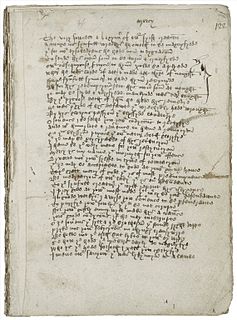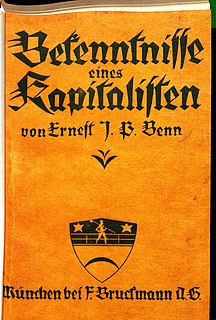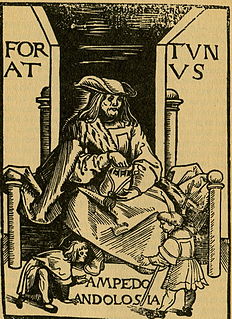
George Chapman was an English dramatist, translator and poet. He was a classical scholar whose work shows the influence of Stoicism. Chapman has been speculated to be the Rival Poet of Shakespeare's sonnets by William Minto, and as an anticipator of the metaphysical poets of the 17th century. Chapman is best remembered for his translations of Homer's Iliad and Odyssey, and the Homeric Batrachomyomachia.

Jeremy Collier was an English theatre critic, non-juror bishop and theologian.

Francis Beaumont was a dramatist in the English Renaissance theatre, most famous for his collaborations with John Fletcher.
The Mermaid Series was a major collection of reprints of texts from English Elizabethan, Jacobean and Restoration drama. It was launched in 1887 by the British publisher Henry Vizetelly and under the general editorship of Havelock Ellis. Around 1894 the series was taken over by the London firm of T. Fisher Unwin. Many well-known literary figures edited or introduced the texts. Some of the plays published had not been reprinted in recent editions, and most had dropped out of the stage repertoire.

Mankind is an English medieval morality play, written c. 1470. The play is a moral allegory about Mankind, a representative of the human race, and follows his fall into sin and his repentance. Its author is unknown; the manuscript is signed by a monk named Hyngham, believed to have transcribed the play. Mankind is unique among moralities for its surprising juxtaposition of serious theological matters and colloquial dialogue. Along with the morality plays Wisdom and The Castle of Perseverance, Mankind belongs to the collection of the Folger Shakespeare Library in Washington, D.C. as a part of the Macro Manuscript.

Oxford World's Classics is an imprint of Oxford University Press. First established in 1901 by Grant Richards and purchased by OUP in 1906, this imprint publishes primarily dramatic and classic literature for students and the general public. Its competitors include Penguin Classics, Everyman's Library, and the Modern Library. Most titles include critical apparatus – usually, an introduction, bibliography, chronology, and explanatory notes – as is the case with Penguin Classics.

The art form known as opera originated in Italy in the sixteenth and seventeenth centuries, though it drew upon older traditions of medieval and Renaissance courtly entertainment. The word opera, meaning "work" in Italian, was first used in the modern musical and theatrical sense in 1639 and soon spread to the other European languages. The earliest operas were modest productions compared to other Renaissance forms of sung drama, but they soon became more lavish and took on the spectacular stagings of the earlier genre known as intermedio.

Sir Ernest John Pickstone Benn, 2nd Baronet, was a British publisher, writer and political publicist. His father, John Benn, was a politician, who had been made a baronet in 1914. He was an uncle of the Labour politician Tony Benn.
Henry Herringman (1628–1704) was a prominent London bookseller and publisher in the second half of the 17th century. He is especially noted for his publications in English Renaissance drama and English Restoration drama; he was the first publisher of the works of John Dryden. He conducted his business under the sign of the Blue Anchor in the lower walk of the New Exchange.
The Humorous Lieutenant, also known as The Noble Enemies, Demetrius and Enanthe, or Alexander's Successors, is a Jacobean era stage play, a tragicomedy written by John Fletcher. Highly praised by critics, it has been called "Fletcher's best comedy."
Beggars' Bush is a Jacobean era stage play, a comedy in the canon of John Fletcher and his collaborators that is a focus of dispute among scholars and critics.
The Arden Shakespeare is a long-running series of scholarly editions of the works of William Shakespeare. It presents fully edited modern-spelling editions of the plays and poems, with lengthy introductions and full commentaries. There have been three distinct series of The Arden Shakespeare over the past century, with the third series commencing in 1995 and concluding in January 2020. Arden was the maiden name of Shakespeare's mother, Mary, but the primary reference of the enterprise's title is named after the Forest of Arden, in which Shakespeare's As You Like It is set.
Literature written in the English language includes many countries such as the United Kingdom and its crown dependencies, Republic of Ireland, the United States, and the countries of the former British Empire. The English language has developed over the course of more than 1,400 years. The earliest forms of English, a set of Anglo-Frisian dialects brought to Great Britain by Anglo-Saxon invaders in the fifth century, are called Old English. Beowulf is the most famous work in Old English, and has achieved national epic status in England, despite being set in Scandinavia. However, following the Norman conquest of England in 1066, the written form of the Anglo-Saxon language became less common. Under the influence of the new aristocracy, French became the standard language of courts, parliament, and polite society. The English spoken after the Normans came is known as Middle English. This form of English lasted until the 1470s, when the Chancery Standard, a London-based form of English, became widespread. Geoffrey Chaucer, author of The Canterbury Tales, was a significant figure in the development of the legitimacy of vernacular Middle English at a time when the dominant literary languages in England were still French and Latin. The invention of the printing press by Johannes Gutenberg in 1439 also helped to standardise the language, as did the King James Bible (1611), and the Great Vowel Shift.
Mark Lee Dexter is an English actor who trained at RADA.

Drama is the specific mode of fiction represented in performance: a play, opera, mime, ballet, etc., performed in a theatre, or on radio or television. Considered as a genre of poetry in general, the dramatic mode has been contrasted with the epic and the lyrical modes ever since Aristotle's Poetics —the earliest work of dramatic theory.

The Pleasant Comedie of Old Fortunatus (1599) is a play in a mixture of prose and verse by Thomas Dekker, based on the German legend of Fortunatus and his magic inexhaustible purse. Though the play is not easy to categorise, it has been called "the only example of an interlude inspired by the fully developed genius of the Renaissance".
The Comical History of Don Quixote is a three-part dramatization of Miguel de Cervantes's celebrated novel Don Quixote. It was written in 1694, only seventy-eight years after the death of Cervantes, by Thomas D'Urfey. It is one of the first stage dramatizations of "Don Quixote" ever written. The piece featured many songs, most of them by Henry Purcell, but there were some by other noted Restoration composers. A highly-abridged early revival of it took place at the 1938 Bath Music Festival.
Ernest Benn Limited was a British publishing house.

The Macro Manuscript is a collection of three 15th-century English morality plays, known as the "Macro plays" or "Macro moralities": Mankind, The Castle of Perseverance, and Wisdom. So named for its 18th-century owner Reverend Cox Macro (1683–1767), the manuscript contains the earliest complete examples of English morality plays. A stage plan attached to The Castle of Perseverance is also the earliest known staging diagram in England. The manuscript is the only source for The Castle of Perseverance and Mankind and the only complete source for Wisdom. The Macro Manuscript is a part of the collection at the Folger Shakespeare Library in Washington, D.C.. For centuries, scholars have studied the Macro Manuscript for insights into medieval drama. As Clifford Davidson writes in Visualizing the Moral Life, "in spite of the fact that the plays in the manuscript are neither written by a single scribe nor even attributed to a single date, they collectively provide our most important source for understanding the fifteenth century English morality play."

Roma Gill OBE, M.A. Cantab., BLitt. Oxon. was a British academic, writer and noted scholar on the works of Shakespeare and Marlowe. She edited more than 30 texts including three in the Oxford School Marlowe series and twenty-one in the Oxford School Shakespeare series, making these works more accessible to younger students. In addition, Gill was a prolific author of scholarly articles and reviews who during her prolific lecturing career inspired her many students with her passion for 16th-century literature. In her later life she developed multiple sclerosis which caused her great pain and disabled her to the extent she couldn't move and had to dictate the notes for her books.










